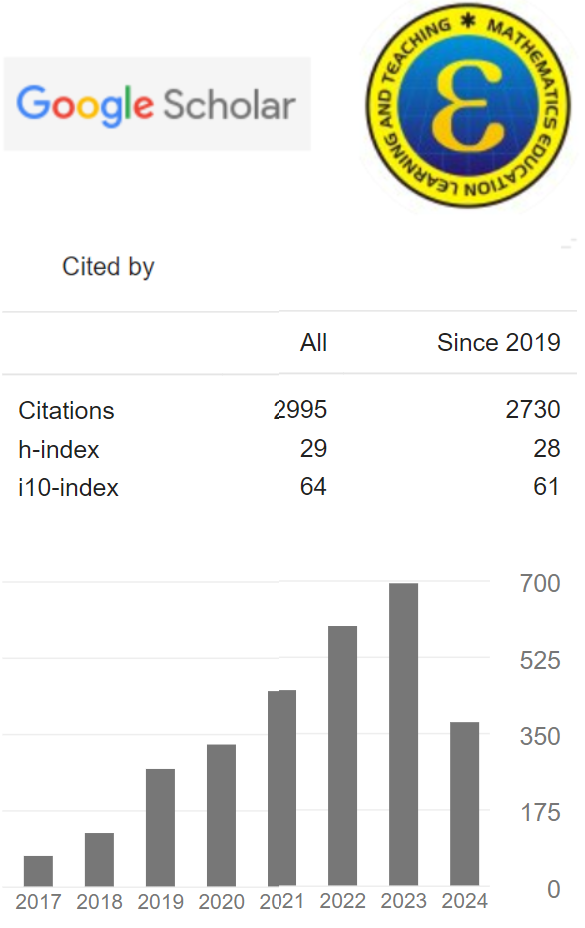The Influence of Self-Efficacy on Students' Mathematical Disposition
(1) IAIN Syekh Nurjati Cirebon
(2) Universitas Lampung
(*) Corresponding Author
Abstract
Keywords
Full Text:
PDFReferences
Bandura, A & Adams, N.E. (1977). Analysis of Self-efficacy Theory of Behavioral Change. New York: Stan-ford University.
Bandura, A. (1997). Self-Efficacy (The Exercise of Control). New York: W.H. Freeman and Company.
Brown, dkk. (1986). Self-Efficacy in the Prediction of Academic Performance and Perceived Career Options. Journal of Counselling Psychology, 33, 265-269. https://doi.org/10.1037/0022-0167.33.3.265
Izzati, N. (2017). Pengaruh Kemampuan Koneksi dan Disposisi Matematis terhadap Hasil Belajar Geometri Bidang Datar Mahasiswa IAIN Syekh Nurjati Cirebon. Eduma : Mathematics Education Learning and Teaching, 6(2), 33. https://doi.org/10.24235/eduma.v6i2.2231
Katz, L. G. (1993). Dispositions as Educational Goals. ERIC Digest.
Maxwell, K. (2015). Positive learning dispositions in mathematics. University of Auckland, Faculty of Education.
NCTM. (1989). Curriculum and Evaluation Standards for School Mathematics. Reston, VA:Authur. Tersedia: www.nctm.org.
NCTM. (2007). The Mathematical Disposition of Structural Engineers. Journal for Research in Mathematics Education, 38(5), pp.477- 506. Retrived from http://www.jstor.org/stable/30034962. Diakses september 2014.
Nugroho, G. N., & Riyanto, O. R. (2019). Mathematical Critical Thinking Ability Reviewed From Self-Efficacy in Discovery Learning. Eduma: Mathematics Education Learning and Teaching, 8(1), 25-32. https://doi.org/10.24235/eduma.v8i1.4593
Pearson Education. (2000). Mathematical Disposition. Tersedia: http://www.teachervision.fen.com/math/teacher-training/55328.html?for_printing=1. Diakses september 2014
Polking J. (1998). Respon to NCTM’s Round 4 Questions. Tersedia: http://www.ams.org/goverment/argrpt4.html. Diakses september 2014.
Sugiarto, A., Yunarti, T., & Widyastuti, W. (2015). Deskripsi Self-Efficacy Berpikir Kritis Matematis Siswa dalam Pembelajaran Socrates Kontekstual. Jurnal Pendidikan Matematika Universitas Lampung, 3(4). Retrived from http://jurnal.fkip.unila.ac.id/index.php/MTK/article/view/9820.
Sumarmo, U. (2003). Daya dan Disposisi Matematik: Apa, Mengapa dan Bagaimana Dikembangkan pada Siswa Sekolah Dasar dan Menengah. In Makalah disajikan pada seminar sehari di Jurusan Matematika ITB.
Utami, W. T., Mustadi, A., Marsigit, M., & Ibrahim, I. (2021). Hubungan Disposisi Matematis dan Self-Efficacy Mahasiswa. AKSIOMA: Jurnal Program Studi Pendidikan Matematika, 10(1), https://doi.org/10.24127/ajpm.v10i1.3025
Wardani, S. (2008). Pembelajaran inkuiri model Silver untuk mengembangkan kreativitas dan kemampuan pemecahan masalah matematik Siswa Sekolah Menengah Atas. Disertasi Doktor pada PPS UPI: tidak dipublikasikan.
Widyanto. E. (2006). Hubungan Antar Self-efficacy dengan Efektivitas Komunikasi pada Receptionist Hotel. Retrived from https://eprints.umm.ac.id/11200/
DOI: 10.24235/eduma.v10i1.8519
Article Metrics
Abstract view : 57 timesPDF - 10 times
Refbacks
- There are currently no refbacks.
Copyright (c) 2022


.png)










